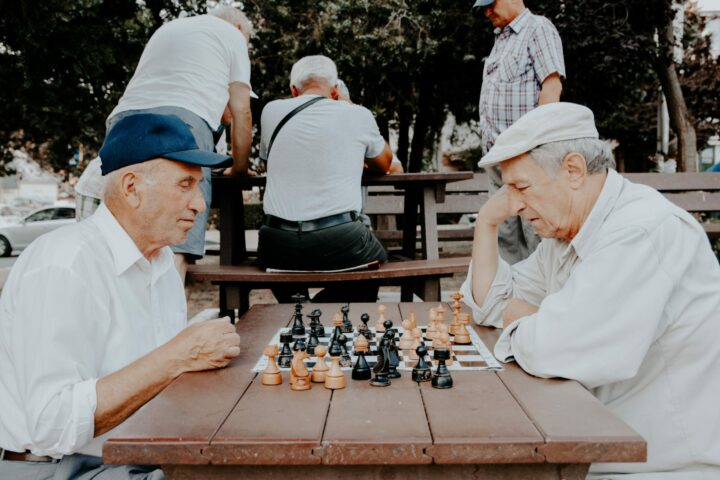Chess tactics hold the key to strategic dominance on the board, and every aspiring player yearns to unravel the secrets behind their success. But what truly is the best way to study chess tactics?
In this captivating guide, we delve deep into the realm of tactical mastery, presenting you with a thought-provoking and unique approach that will revolutionize your chess game. Prepare to embark on a journey that will transform your understanding of chess tactics and elevate your gameplay to astonishing heights.
How do chess tactics enhance your strategic prowess?
Chess tactics are like the secret weapons hidden within the intricacies of the game. By honing your tactical skills, you unleash a power that elevates your strategic prowess to extraordinary levels. Each tactical maneuver becomes a mesmerizing dance of calculation, intuition, and foresight.
These tactics allow you to seize opportunities, exploit weaknesses, and turn the tide of any game in your favor. With each successful tactical strike, you gain confidence and gain a deeper understanding of the game’s dynamics, transforming you into a formidable chess strategist.
Are there specific tactics that beginners should focus on initially?

For beginners venturing into the vast world of chess, it’s crucial to build a solid foundation. Rather than being overwhelmed by the countless tactical possibilities, it’s best to focus on a few key tactics that form the bedrock of chess understanding.
Tactics like pins, forks, skewers, and discovered attacks provide the groundwork for more complex combinations. By mastering these fundamental tactics, beginners gain a solid foothold in the chess realm and lay the groundwork for future tactical brilliance.
What role does pattern recognition play in mastering chess tactics?
Pattern recognition is the secret language spoken by the grandmasters of chess. When studying tactics, recognizing recurring patterns becomes an invaluable skill. These patterns are like breadcrumbs guiding you to hidden opportunities on the chessboard.
From double attacks to mating patterns, pattern recognition allows you to quickly identify tactical possibilities and seize the advantage. As you immerse yourself in the rich tapestry of chess tactics, pattern recognition becomes your trusty compass, guiding you to victory with elegance and precision.
Is it more effective to study tactics through puzzles or actual gameplay?
While both puzzles and gameplay contribute to your tactical growth, they offer distinct advantages. Puzzles provide concentrated doses of tactical challenges, allowing you to sharpen your calculation skills and intuition in a controlled environment.
On the other hand, studying tactics through actual gameplay exposes you to the dynamic nature of chess, where you must navigate the complexities of the board under real-time pressure. By combining puzzle-solving with real-game analysis, you cultivate a balanced tactical prowess that seamlessly translates into practical success.
How can analyzing famous chess games improve your tactical abilities?
Delving into the treasure trove of famous chess games is like embarking on a historical quest for tactical wisdom. By studying the brilliant moves of chess legends, you gain invaluable insights into the intricacies of tactics. You witness the birth of stunning combinations, the artistry of sacrifices, and the devastating power of decisive tactical blows.
These games serve as an endless source of inspiration and instruction, refining your tactical vision and expanding your repertoire of moves. Analyzing famous chess games becomes a window into the minds of the chess masters, allowing you to absorb their tactical genius and infuse it into your own gameplay.
Are there any psychological aspects to consider when studying chess tactics?
Beyond the technical aspects of chess tactics, understanding the psychological dimensions is key to unleashing their full potential. The mind is a battleground in chess, and psychological factors can significantly impact tactical decision-making. Developing mental resilience, maintaining focus amidst distractions, and managing time pressure are crucial aspects to consider when studying tactics.
Moreover, understanding your opponent’s psychological vulnerabilities allows you to exploit their weaknesses and unleash devastating tactical blows. By mastering the psychological aspects of chess, you gain a formidable edge on the battlefield.
Can studying endgame tactics enhance your overall gameplay?
The endgame, often considered the soul of chess, is where tactical mastery truly shines. Studying endgame tactics not only enhances your ability to convert advantages into victories but also improves your overall gameplay. Endgame tactics teach you the art of precise calculation, accurate piece coordination, and maneuvering to exploit even the smallest advantages.
As you delve into the intricacies of endgame tactics, you develop a deep understanding of piece activity, pawn promotion, and mating patterns, enabling you to outmaneuver your opponents at critical junctures and secure triumph in the final stages of the game.
Are there any unconventional approaches to studying chess tactics?
In the realm of chess tactics, embracing unconventional approaches can open doors to unexpected breakthroughs. While puzzles and game analysis are traditional methods, exploring alternative avenues can yield fresh perspectives and ignite innovative thinking.
Engaging in tactical brainstorming sessions with fellow chess enthusiasts, simulating challenging scenarios through computer simulations, or even exploring chess-themed literature and art can provide unique insights into tactics. By thinking outside the conventional chessboard, you unleash your creativity, nurture unconventional ideas, and forge a distinct tactical style that sets you apart from the rest.
What are the best resources for finding challenging tactical exercises?

Embarking on a quest for challenging tactical exercises is an exhilarating endeavor that fuels your growth as a chess tactician. Fortunately, the chess world offers a plethora of resources to sharpen your skills. Online platforms and mobile applications provide vast libraries of tactical puzzles, ranging from beginner-friendly to brain-bending challenges for seasoned players.
Chess books authored by renowned grandmasters are treasure troves of tactical brilliance, guiding you through intricate combinations and enlightening you with strategic insights. Additionally, chess forums, online communities, and chess clubs offer a rich tapestry of shared puzzles, discussions, and collaborative learning. With these diverse resources at your fingertips, you can embark on an exciting journey of constant tactical discovery.
How does studying tactics from different chess variations impact your skills?
The chess universe is brimming with diverse variations, each offering unique tactical intricacies. By exploring tactics across different chess variations, you broaden your tactical horizon and nurture adaptability in your gameplay. Variations such as blitz chess, bullet chess, or even chess variants like Fischer Random Chess or Chess960 present distinct tactical challenges, testing your ability to calculate moves under time pressure or in unfamiliar positions.
Each variation unveils new tactical motifs, strategic patterns, and unconventional approaches, enhancing your overall tactical arsenal and enriching your understanding of the game. Embrace the multitude of chess variations, and let their tactical wonders invigorate your growth as a versatile player.
Are there any recommended time frames for practicing chess tactics?
Practicing chess tactics is a delicate art that requires a balance between quality and quantity. While there is no one-size-fits-all answer to the ideal time frame, consistency and regularity are key. Devote dedicated sessions to tactical exercises, allowing yourself enough time to delve into the puzzles without rushing through them.
Aim for a practice routine that aligns with your schedule and commitments, ensuring that you have sufficient time to focus and immerse yourself in the intricacies of each puzzle. The key is to strike a harmonious equilibrium that enables you to challenge your mind, reinforce tactical patterns, and enjoy the process of unraveling the mysteries of chess tactics.
What techniques can you use to memorize and recall tactical patterns?
Memorizing and recalling tactical patterns is akin to mastering the language of chess. To enhance your memory and facilitate pattern recognition, employ mnemonic devices, such as creating memorable stories or visual associations for each pattern. Break down complex combinations into smaller, digestible elements, allowing your brain to absorb and retain the patterns more effectively.
Repetition is also a powerful tool; revisiting tactical puzzles and actively reviewing past successes and failures engrains the patterns into your memory.
Additionally, practicing visualization exercises, both on and off the chessboard, hones your ability to mentally recreate tactical scenarios. By employing these techniques and nurturing a disciplined practice routine, you empower your mind to effortlessly summon tactical patterns when they are most needed.
How can studying chess tactics improve your overall decision-making ability?
Studying chess tactics acts as a crucible that refines your decision-making ability both on and off the chessboard. As you immerse yourself in tactical puzzles, you develop keen analytical skills, honing your ability to evaluate positions, anticipate threats, and calculate potential moves.
The intricate dance of tactics instills in you a sense of critical thinking, enabling you to assess risks and rewards with precision. Transcending the realm of chess, these decision-making skills permeate into various aspects of life, empowering you to make informed choices, adapt to dynamic situations, and navigate challenges with strategic foresight.
Are there any strategies for applying chess tactics effectively in real games?

Firstly, cultivate a vigilant mindset, constantly scanning the board for tactical opportunities and potential weaknesses in your opponent’s position. Patience is key; resist the temptation to force tactics prematurely and wait for the opportune moment to strike. Capitalize on positional advantages by setting up tactical traps, and luring your opponent into positions that favor your strategic intent.
Additionally, maintain flexibility and adaptability, adjusting your tactical approach as the game evolves. By integrating these strategies into your gameplay, you transform chess tactics from isolated moves into a cohesive, dynamic force that overwhelms your opponents and propels you toward victory.
How can analyzing your own games help you identify tactical weaknesses?
| Method | Advantages | Considerations |
|---|---|---|
| Puzzles |
|
|
| Game Analysis |
|
|
| Studying Famous Games |
|
|
| Chess Variations |
|
|
| Self-Analysis |
|
|
Analyzing your own games serves as a profound voyage of self-discovery, unraveling the hidden tapestry of your tactical weaknesses. By revisiting your games, you gain invaluable insights into your decision-making, identifying moments where tactical opportunities were missed or poorly executed.
Scrutinize critical positions, dissect the moves, and explore alternative tactical possibilities. Embrace the perspectives of both victor and vanquished, analyzing games where your tactical brilliance shines and instances where you fell victim to cunning tactics.
Through this introspective journey, you develop a deeper understanding of your tactical blind spots, enabling you to strengthen them through focused practice. Embrace the power of self-reflection, and let the lessons learned from analyzing your own games fortify your tactical prowess.
Closing thoughts
In the intricate realm of chess tactics, a world of endless possibilities awaits those who dare to explore its depths. By adopting a multifaceted approach to studying tactics, incorporating resources like puzzles, game analysis, and famous chess games, you unlock the doors to tactical brilliance.
As you immerse yourself in the art of pattern recognition, mental agility, and strategic decision-making, you embark on a journey of self-improvement that transcends the boundaries of the chessboard.
Remember, the study of chess tactics is not just about mastering moves; it is a transformative experience that enhances your problem-solving skills, expands your creative thinking, and refines your overall approach to decision-making.
Embrace the challenge, delve into the mysteries of chess tactics, and witness as your gameplay ascends to unprecedented levels of brilliance and triumph.




